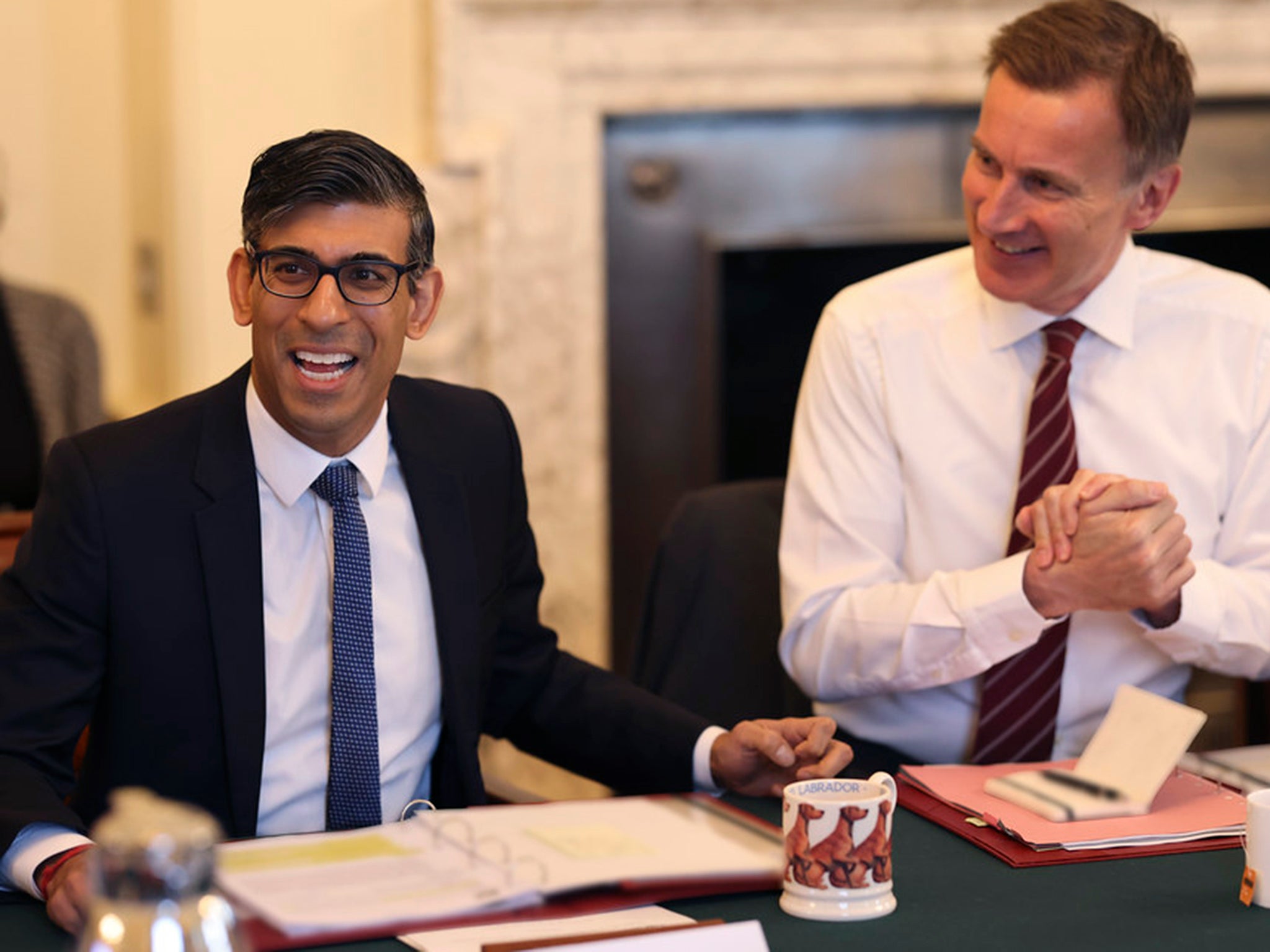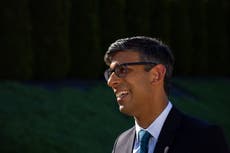Rishi Sunak ‘wants to cut tax by 2p’ before general election
PM said to be keen on reviving his Tory leadership pledge to bring down income tax rate
Rishi Sunak is said to be keen to cut income tax or National Insurance by two pence before the general election next year in a bid to both “incentivise work” and win votes.
With senior Conservatives pressuring the prime minister for tax cuts in the autumn, the government has been examining whether significant cuts are possible given grim news on persistent inflation.
Mr Sunak wants a two pence cut to the basic rate of income tax or an equivalent reduction in National Insurance, according to the Sunday Telegraph.
The PM is said to be keen to go into the election expected in 2024 promising to go further on tax cuts – having promised to do so in his leadership campaign.
The newspaper quoted a senior government source: “Cutting tax on working people is something [Mr Sunak] strongly believes in. He wants to incentivise work.”
Another source said: “No one should be in any doubt that we will go into the election having cut taxes and promising to do more.”
However, a No 10 source told The Independent there were no discussions about tax cuts at the moment – saying the focus was on getting inflation down. A Treasury spokesman said: “We don’t comment on speculation about tax changes outside of fiscal events.”
Mr Sunak and his chancellor Jeremy Hunt have said they would like to cut taxes but have emphasised the immediate priority is meeting on the five pledges – to halve inflation by the end of the year.
Mr Hunt has said there was “nothing automatic” about reducing the country’s inflation rate – with core price rises proving stickier than expected.
Despite falling from 10.1 per cent to 8.7 per cent, the Bank of England governor Andrew Bailey has warned it is taking longer to come down than thought – fuelling bets on higher interest rates.

Mr Sunak, as chancellor, had announced a one pence income tax cut for 2024 – reducing the 20 per cent rate to 19 per cent – but the move was ditched by Mr Hunt late last year following the disastrous mini-Budget during Liz Truss premiership.
Fighting for the Tory leadership last summer, Mr Sunak promised he would cut income tax would fall to 16 per cent by the end of the decade. The respected Institute for Fiscal Studies (IFS) think tank warned that it would cost an additional £19bn per year.
Mr Sunak reportedly hopes to go into the election campaign against Labour with a “revived version” of his Tory leadership pledge to cut income tax during the next parliament.
Earlier this week the former prime minister Liz Truss lent her support to calls by senior Tories to abolish inheritance tax. More than 50 Tory MPs, including former chancellor Nadhim Zahawi, have urged Mr Sunak to scrap the tax altogether.
Dan Neidle, the founder of the Tax Policy Associates think tank, has noted that abolishing it would mean losing that tax revenue “to benefit the wealthiest four per cent”. He called for exemptions benefitting the rich to be scrapped and the overall rate to be reduced from 40 per cent.
Meanwhile, the GMB union general secretary Gary Smith has attacked Labour’s economic policies, saying that the proposed ban on new oil and gas production “are going to create a cliff edge” in the North Sea.
The proposals, confirmed by Labour leader Sir Keir Starmer last week, would ban new licences for oil and gas extraction in the North Sea but still allow existing projects to continue until 2050 as part of the party’s push towards a green energy transition.
The union boss described Labour as “naive”. Speaking on Sky News, Mr Smith called on the party to stop putting what was “popular” ahead of what was right for the country, and said that workers in the industry were “very worried” about the plans.
Jonathan Reynolds, the shadow business secretary, stood by the plans, telling BBC’s Laura Kuenssberg that energy extraction in the North Sea would continue until 2050, protecting the 28,000 workers in the sector. “The big opportunity comes from the transition and we don’t think further new oil and gas fields are the answer.”
Join our commenting forum
Join thought-provoking conversations, follow other Independent readers and see their replies
Comments



Bookmark popover
Removed from bookmarks